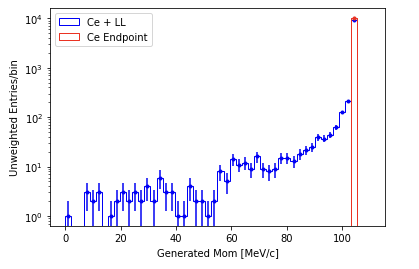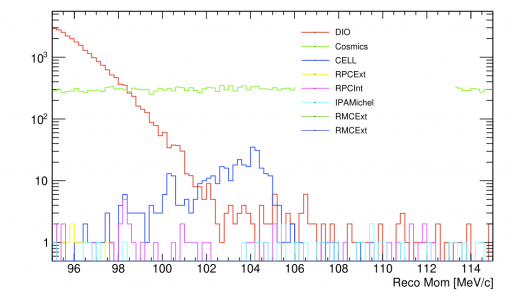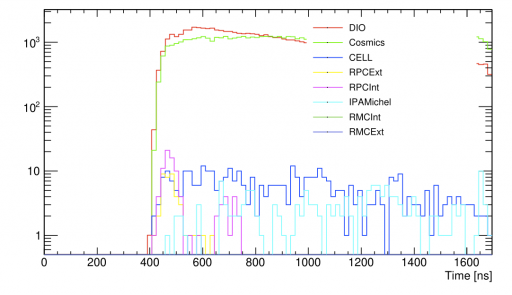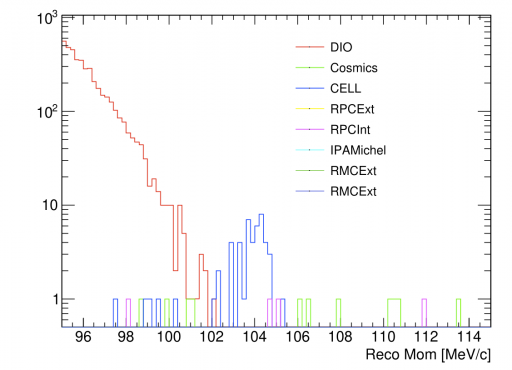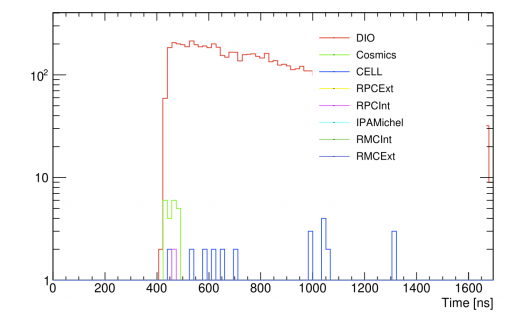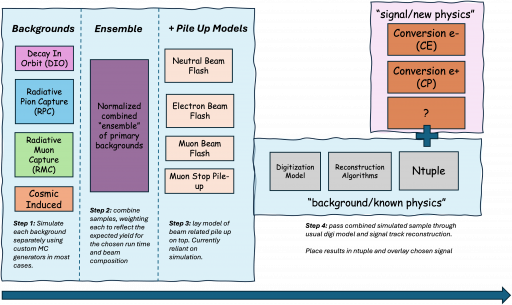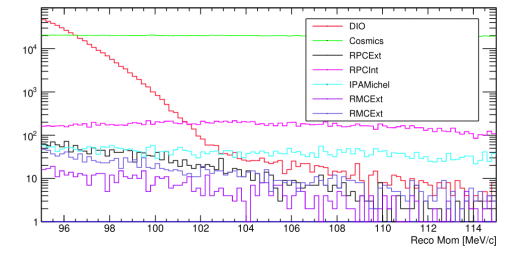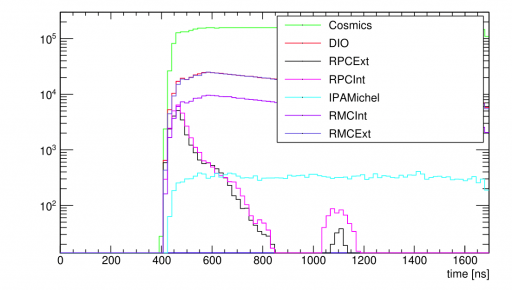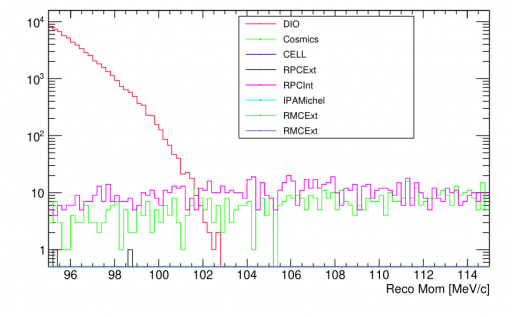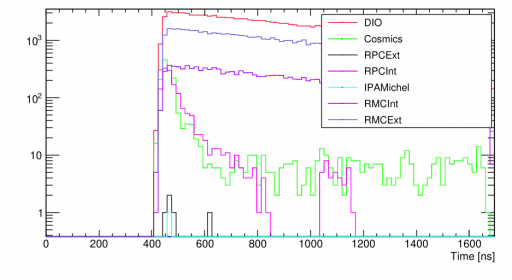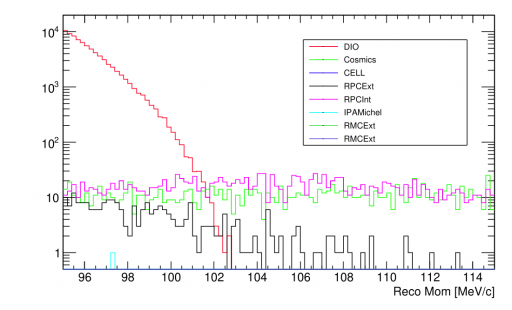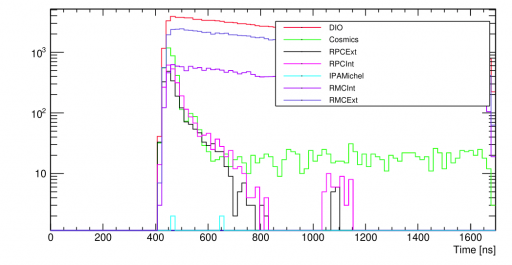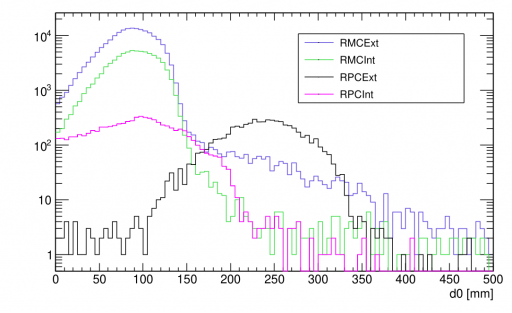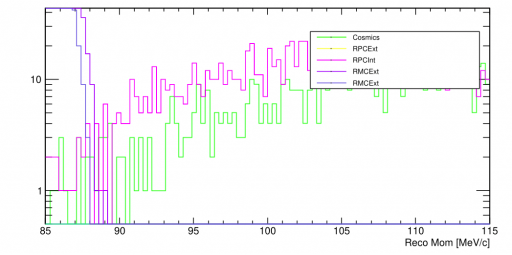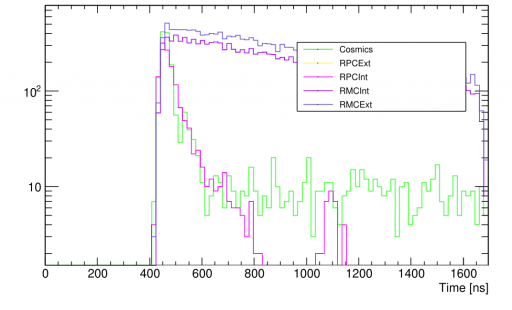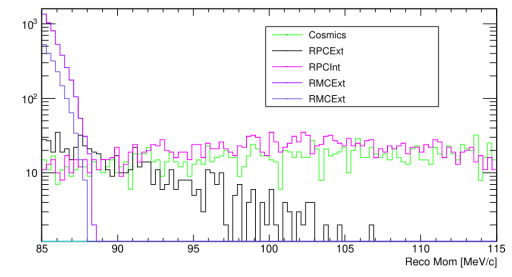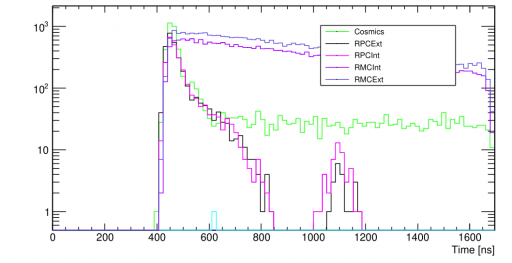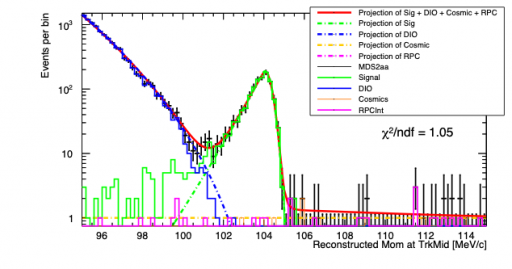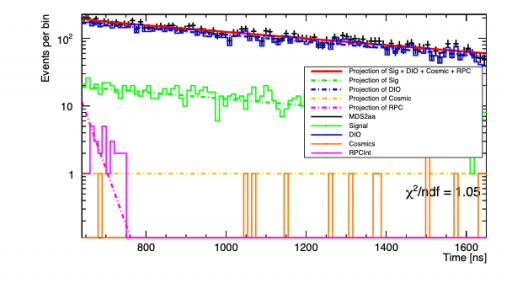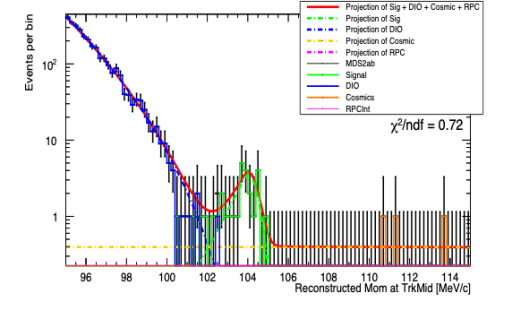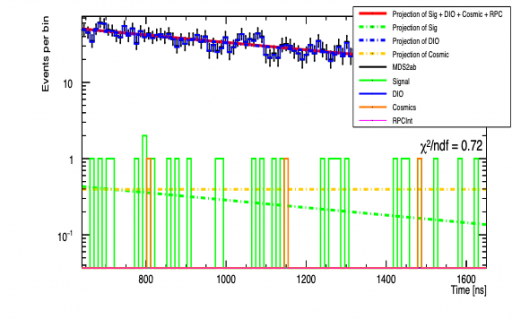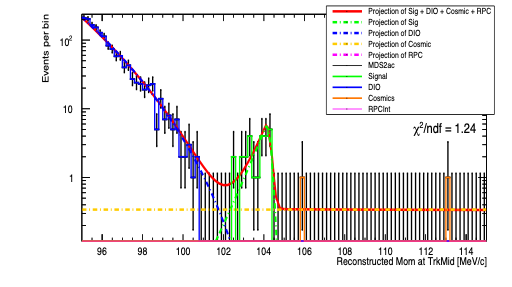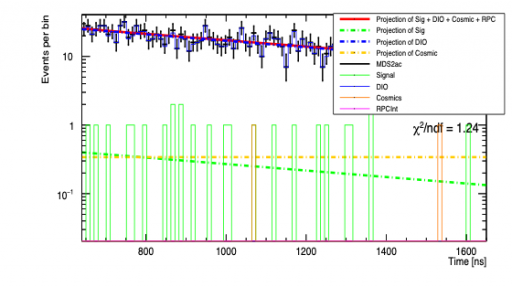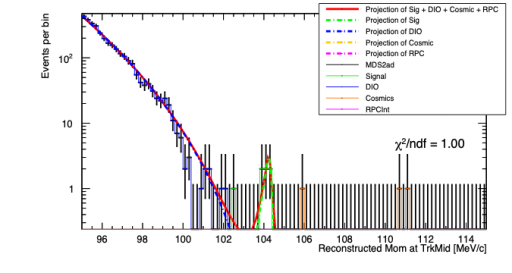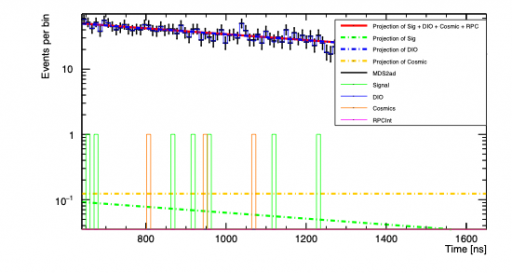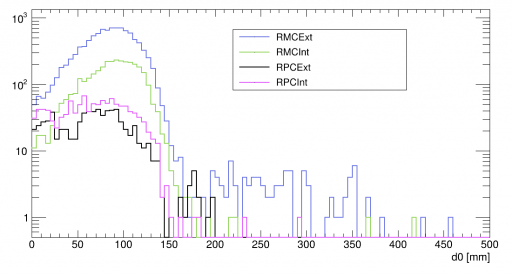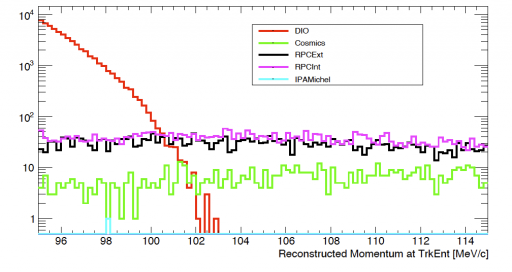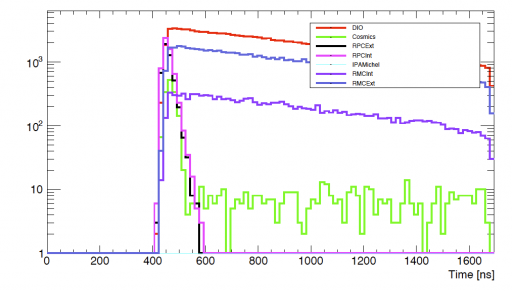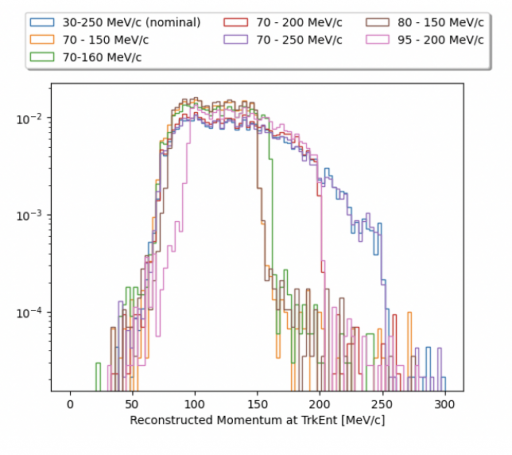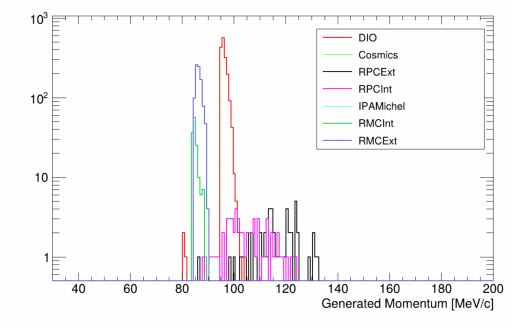Mock Data (MDS)
MDC2020 ensembles
MDC2024 is the original name which is now part of MDC2020, and refers specifically to the ensembles/mock data made using MDC2020 stops and primaries.
Introduction
Mock data samples can be helpful in two ways:
- to help prepare physics analysis efforts;
- to help us understand the size of our data .art files and ntuples.
Notes and Developer Details
https://docs.google.com/spreadsheets/d/1bJS8e5AjnK8CR9j4Bcket7a7vv9A4sAgC2AbTUPl7t4/edit?usp=sharing
Streams
The two purposes above (physics studies, trigger studies) will result in different samples, with differing complexity.
Physics stream
Includes all major components and pile-up. The DIOtail momentum cut can be higher (nominally p>95 MeV/c will be used as a starting point). Three samples will be made: signal at just below current limit (1e-13), closed sample (random signal choice), no signal.
Trigger stream
Here all backgrounds and pile-up will be included but no signal. The DIOtail cut is reduced below the trigger threshold to p > 75 MeV/c.
Inputs
There are several assumptions made when we choose a livetime:
Booster Batch Mode
The Booster Batch (BB) mode describes the incoming operational mode of the booster which feeds the beam through our delivery ring which in turn passes protons to Mu2e.
There are two "run modes" in Mu2e: 1BB and 2BB, in the low-intensity running mode the mean intensity is 1.6E7 protons/pulse and in the higher-intensity mode this becomes 3.9E7 protons/pulse.
| Batch | Time (s) | T Cycle (s) | T Spill (s) | Spills | frac | On Spill Time | N-cycles | POT per cycle |
|---|---|---|---|---|---|---|---|---|
| 1 | 9.52E+06 | 1.33 | 1.07E-01 | 4 | 0.323 | 3.07E+06 | 7.16E+06 | 4.00E+12 |
| 2 | 1.58E+06 | 1.4 | 4.31E-02 | 8 | 0.246 | 3.89E+05 | 1.13E+06 | 8.00E+12 |
Expected DIOs
The expected number of muon stops per POT is 1.56E-3 muons/POT (from MDC2020p). The decay : capture ratio for Al is 0.39:0.61.
In our simulation, we tend to focus on simulating the higher momentum tail with cuts of p > 75MeV/c sampling a fraction of 4.19E-07 of the entire DIO spectrum. and p > 95 MeV/c sampling a fraction of 3.64E-11 of the entire DIO spectrum.
| livetime | BB | POT | Stopped Muons | DIOs (p>75MeV/c) | DIOs (p>95MeV/c) |
|---|---|---|---|---|---|
| 1 hour | 1BB | 1.08E16 | 1.67e+13 | 7.10e6 | 609 |
Sim Efficiencies and Databases
One major improvement from the previous MDC2018 is that we now have database implementation in Mu2e. This includes a "SimEfficiency" data-base which can be used to extract the expected rates from the simulation, without need for hardcoding. Here is an example of how to extract the number of stopped muons per pot:
# get stopped rates from DB
dbtool = DbService.DbTool()
dbtool.init()
args=["print-run","--purpose","MDC2020_best","--version","v1_1","--run","1200","--table","SimEfficiencies2","--content"]
dbtool.setArgs(args)
dbtool.run()
rr = dbtool.getResult()
# get number of target muon stops:
target_stopped_mu_per_POT = 1.0
rate = 1.0
lines= rr.split("\n")
for line in lines:
words = line.split(",")
if words[0] == "MuminusStopsCat" or words[0] == "MuBeamCat" :
#print(f"Including {words[0]} with rate {words[3]}")
rate = rate * float(words[3])
target_stopped_mu_per_POT = rate * 1000
print(f"Final stops rate muon {target_stopped_mu_per_POT}")
Production Scripts
To automate parts of the process a number of scripts have been written. These reside in the Produciton repo: Production/ensembles.
There are a number of helper scripts available:
ensemble python scripts
- normalization.py - calculated normalization for each sample based on user assumptions
- maketemplatefcl.py - makes the SamplingInput fcl for the provided data set
- calculateEvents.py - prints number of a specific process events for chosen user inputs
ensemble shell scripts
- Stage1: the S1 script tells you the minimum number of events needed to match a chosen cosmic sample for each input process. The number of jobs for each input process must match the number of chosen cosmic files. You could simulate more than this to allow for failure modes, but only use that number of jobs in the eventual ensembling.
- Stage2: this script combines the input samples, the template fcl and passes these to the grid to run the parrallized ensembling using the standard Mu2e grid tools.
- validation: this script loops over the grid log files and accessess the specific part telling how many of each input were in fact sampled. It sums up those and spits out the total amount of dts events from each process (this includes the dts efficiency, so its only a validation)
Components
DIO tail
The DIO tails is simulated from stopped muons using the SingleProcessGenerator defined in the Offline EventGenerator directory. The DIOGenerator tool is used to provide the correct momentum distribution based on the 5-8 polynomial derived by Czarnecki et al.
A filter called GenFilter is used to remove events unlikely to produce viable events in the reconstruction. The effect of the filter is to improve the time performance by 40%, there is no loss of efficiency.
Two DIO tail samples are included as primaries in two sets of samples for MDC2024: one has a cut at p > 95 MeV/c (a fraction of 3.64e-11 of the entire DIO momentum spectrum) and another has a lower cut, below the trigger threshold, of p > 75 MeV/c (a fraction of 4.19e-7 of the entire DIO spectrum).
In previous simulation studies, DIOs of all momenta are included in the pile-up stream and not as primaries, including them as primaries has the advantage of giving us a large sample of events and therefore increased realism.
Conversion and Conversion Leading Log
CeEndpoints are a standard part of production. The Leading Log camapign includes the leading log corrections calculated by Szafron. This results in about 10% of electrons being in a lower momentum tail (as opposed to all being at 104.97 MeV/c in the case of the CeEndpoint).
Cosmics
As part of SU2020 a campaign that used the CORSIKA generator was built and exercised, providing 1.1e7s of cosmic events to be sampled from. Similarily a campaign of a similar size using the CRY generator is also available.
The CRY sample is used for pass 0, but the CORSIKA one is used for the later camapigns.
Pile-up
For pass 0 the existing pile-up streams were used. These were mixed with the combined primary sample as if it were any other primary sample.
This will provide some inaccuracies, as we are mixing in two DIO samples (one as a primary for p > 95 MeV/c and one which is part of the MuStopPileup sample and covers all momentum ranges up to the endpoint). This could introduce some double counting but it is unlikely to overly effect the outcomes of any physics analysis applied to these samples.
For future passes, custom pile-up samples will be combined as primaries in the same way we have done the DIO tails.
RPC
RPC is simulated using the RPCGun generator. Both internal and external RPC can be simulated using the same generator.
At timing filter on arrival proper time of the stopped pions is used to improve performance of the simulation. This must be factored in when normalizing the samples.
DIO 75MeV/c short tests
A set of very short samples with a p>75MeV/c cut on the DIO tail were generated to get a feel for the size and time taken to generate this sample. These are available for anyone testing the trigger, but not useful for physics studies. The larger DIOtail only sample can also be used as in all cases the eventual events were all DIOtails.
| Tag | Processes | BB | equiv. time | equiv. POT | Rmue | conditions | Comments | sam name |
|---|---|---|---|---|---|---|---|---|
| testa | CE+DIO(75MeV/c) | 1BB | 17s | 5.22e13 | 0 | perfect | dts,dig,mcs | ensemble-1BB-CEDIO-60s-p75MeVc |
| testb | CE+DIO(75MeV/c)+CRY | 1BB | 17s | 5.22e13 | 0 | perfect | dts,dig,mcs | ensemble-1BB-CEDIOCRYCosmic-60s-p75MeVc |
| testc | CE+DIO(75MeV/c) | 2BB | 13s | 7.7e13 | 0 | perfect | dts,dig,mcs | ensemble-2BB-CEDIO-60s-p75MeVc |
| testd | CE+DIO(75MeV/c)+CRY | 2BB | 13s | 7.7e13 | 0 | perfect | dts,dig,mcs | ensemble-2BB-CEDIOCRYCosmic-60s-p75MeVc |
| teste | CE+DIO(75MeV/c)+CRY | 1BB | 0 | perfect | dts only | ensemble-1BB-CEDIOCRYCosmic-3600s-p75MeVc | ||
| testf | CE+DIO(75MeV/c)+CRY+PU | 1BB | 0 | perfect | dts only | ensembles-1BB-CEDIOCRYCosmic-60s-p75MeVc-OnSpillMix1BBTriggered |
Mock-Dataset-0 (MDS0) (95 MeV/c)
The MDS0 samples all include DIO tail events with the 95 MeV/c cut.
All components except the RPC are included. Two Rmue values are used, one at 1e-13 which is just below the present upper limit (7e-13) and allows around 55 generated CE events for the 1 week sample and 222 generated CE for the 1 month livetime (before any selection or reconstruction efficiency is factored in).
Input Samples
Here is a list of the relevant samples used as part of the current Mock Data effort.
The exact samples input into each MDS is mentioned below.
| process | campaign | generated | reconstructed | livetime (s) (1BB) | POT equiv | eff |
|---|---|---|---|---|---|---|
| CosmicCORSIKA | MDC2020ae | 9568173 | 1.1e7 | |||
| DIOtailp95MeVc | MDC2024a_4 | 401760000 | 192315262 | 6032089213 | 1.81416E+22 | 0.478 |
| DIOtailp75MeVc | MDC2024a_3 | 160000000 | 28887387 | 2.03E+05 | 6.11958E+17 | 0.180 |
| DIOtail (95) | MDC2020ad | 3267000 | 1534077 | 127960436.9 | 3.84843E+20 | 0.469 |
| DIOtail (75) | MDC2020ad_sm0 | 170150000 | 30357435 | 2219329 | 6.67465E+17 | 0.178 |
| CeEndpoint | MDC2020ac | 100000 | 54280 | 0.542 | ||
| CeMLeadingLog | MDC2024a_sm4 | 22400 | 11687 | 0.522 |
ensembles
The samples available are listed below:
| Tag | Processes | BB | eqiv POT | equiv livetime | Rmue | conditions | sam name | Comments |
|---|---|---|---|---|---|---|---|---|
| MDS0a | CE+DIO(95MeV/c) | 1BB | 1.50e18 | 4.89E+05 (5.7days) | 9.39E-14 | best,perfect | nts.mu2e.MDS0a.MDC2020ad_perfect_v1_2.root | |
| MDS0b | CE+DIO(95MeV/c)+CRY | 1BB | 5.61E+17 | 1.86E+05 (2.1 days) | 1e-13 | best,perfect | nts.mu2e.MDS0b.MDC2020ad_perfect_v1_3.root | |
| MDS0c | CE+DIO(95MeV/c)+CRY | 1BB | 2.31E+18 | 7.70E+05 (8.9 days) | 8.88E-14 | best,perfect | ensemble-1BB-CEDIOCRYCosmic-2400000s-p95MeVc-Trigger- | |
| MDS0d | CE+DIO(95MeV/c)+CRY+PU | 1BB | 5.84E+17 | 1.94E+05 (2.2 days) | 1.35E-13 | perfect | ensemble-1BB-CEDIOCRYCosmic-600000s-p95MeVcMix1BBTriggered | normalization somewhat handwavy here, expect similar to pass0b |
| MDS0e | CE+DIO(95MeV/c)+CRY | 1BB | 1e-13 | perfect | dts only: ensemble-1BB-CEDIOCRYCosmic-31000000s-p95MeVc | largest simple sample |
The dts, digi, mcs and TrkAna ntuples are available in the usual locations. In most cases the digi and reco stages were ran with perfect and best condtions.
The component samples which went into these streams are listed here:
| process | tag | Comments |
|---|---|---|
| CeEndpoint | MDC2020ac | |
| DIOtail (95MeV/c) | MDC2020ad | |
| DIOtail (75MeV/c) | MDC2020ad_sm0 | |
| CRY Comsic | MDC2020s | 1 year sample, signal stream |
| pile-up/stops | MDC2020p | most recently made mu beam sample |
Yields
Before any cuts are applied the true values for each process can be derived using the Process Code:
| tag | DIOtail | CE | Cosmics | Other |
|---|---|---|---|---|
| MDS0a | 9966 | 49 | N/A | |
| MDS0b | 3801 | 20 | 4684 | |
| MDS0c | 15691 | 73 | 19101 | |
| MDS0d | 3956 | 28 | 4681 |
Once a standard set of cuts is defined we will apply those and update these yields.
Effects of Pile-up
Samples pass0b and pass0d are essentially the same, in terms of physics contributions. However, pass0d contains standard pile up. Here is a list of the processess reconstructed in each file:
- Pass0b:
[(38, 'cosmicCRY', 4684)] process code counts: [(12, 'compt', 71), (13, 'conv', 882), (14, 'Decay', 181), (17, 'eIoni', 24), (31, 'muIoni', 2269), (34, 'muPairProd', 143), (56, 'mu2ePrimary', 4684), (97, 'neutronInelastic', 2), (99, 'pi_PlusInelastic', 1), (114, 'DIO', 7), (116, 'muonNuclear', 4), (166, 'mu2eMuonDecayAtRest', 3801), (167, 'mu2eCeMinusEndpoint', 20)]
- Pass0d
(38, 'cosmicCRY', 4681) process codes: [(12, 'compt', 176), (13, 'conv', 892), (14, 'Decay', 470), (17, 'eIoni', 39), (31, 'muIoni', 2285), (34, 'muPairProd', 139), (56, 'mu2ePrimary', 4681), (97, 'neutronInelastic', 1), (100, 'pi_MinusInelastic', 1), (114, 'DIO', 456), (116, 'muonNuclear', 4), (133, 'RadioactiveDecayBase', 1), (165, 'mu2eMuonCaptureAtRest', 4), (166, 'mu2eMuonDecayAtRest', 3956), (167, 'mu2eCeMinusEndpoint', 28)
So, as you see, the total number of mu2eMuonDecayAtRest is similar, a slight increase in 0d. This could be a result of decays < the chosen cut but also there will be some chance of double counting in current PU model. Part of the goals moving forward is to remove that possibility. There are also a few more CeMinusEndpoints. Whether these would pass selection cuts is not known. We see an increase in compton events, Decay events and DIO (which includes Michel decays and DIFs). We see a small amount of capture backgrounds (4).
Mock Dataset 1 (MDS1)
MDS1 will inherit from the MDC2020ae (Cosmics) and MDC2020ai primaries
Several updates are made for MDS 1:
- CeEndpoint now including the leading log too;
- DIO tail momentum cut moved to 75 MeV/c for triggered stream only;
- CORSIKA generator used for cosmics;
- PU streams upgraded (might move to pass2).
- RPC time filtering for in-time bkg
All will assume 1BB:
| Tag | Processes | equiv livetime | Rmue | |
|---|---|---|---|---|
| MDS1a | CELL+DIO(95MeV/c)+CORSIKA | ~1 week | 1e-13 | |
| MDS1b | CELL+DIO(75MeV/c)+CORSIKA | ~1 day | 1e-13 | |
| MDS1c | CELL+DIO(95MeV/c)+CORSIKA | ~1 month | 0 | |
| MDS1d | CELL+DIO(95MeV/c)+CORSIKA | ~ 4 months | 1e-13 | |
| MDS1e | CELL+DIO(75MeV/c)+CORSIKA+PU | ~ 1 day | 0 | |
| MDS1f | CELL+DIO(95MeV/c)+CORSIKA+PU | ~1 week | 1e-13 | |
| MDS1g | CELL+DIO(95MeV/c)+CORSIKA+RPC | ~1 week | 1e-13 |
Additional signals will follow
| process | tag | events |
|---|---|---|
| CeMLeadingLog | MDC2024a_sm4 | 800K |
| DIOtail (95MeV/c) | MDC2024a_sm4 | very large |
| DIOtail_95 (95MeV/c) | MDC2020ai | 1 year |
| DIOtail_75 (75MeV/c) | MDC2020ai | 1 year |
| DIOtail (75MeV/c) | MDC2024a_sm3 | 1 week |
| CORSIKA | MDC2020ae | |
| pile-up/stops | MDC2020p | - |
MDS1a
The config is as follows:
njobs= 50 rmue= 1e-13 dem_emin= 95 stops= MDC2020p cosmics= MDC2020ae current= MDC2020ai inputprimary= MDC2020ai livetime= 623819 BB= 1BB Tcycle= 1.33 POT_per_cycle= 4000000000000.0 onspilltime= 201493.537 NPOT= 1.8761473684210527e+18 CEMLL= 177.97751169106488 DIOfrac= 3.6370937564509995e-11 DIO= 41560.339992620764 CORSIKA= 201493.537 Mixed= No
The values extracred from the ensemble log files are as follows (factoring random sampling and efficiencies):
CeMLL 147 DIO 19913 (47% efficiency) Cosmic 184863
Samples:
| family | location |
|---|---|
| dts | /pnfs/mu2e/tape/usr-sim/dts/sophie/ensembleMDS1a/MDC2020ai/art/ |
| ensemble logs | /pnfs/mu2e/tape/usr-etc/cnf/sophie/ensembleMDS1a/MDC2020ai_logs/tar/ |
| dig | /pnfs/mu2e/tape/phy-sim/dig/mu2e/ensembleMDS1aOnSpillTriggered/MDC2020ai_perfect_v1_3/art |
| mcs | /pnfs/mu2e/tape/phy-sim/mcs/mu2e/ensembleMDS1aOnSpillTriggered/MDC2020ak_perfect_v1_3/art (reprocesses) |
| nts | /pnfs/mu2e/tape/phy-nts/nts/mu2e/ensembleMDS1aOnSpillTriggered/MDC2020ak_perfect_v1_3/root/73/db/ (v6) |
MDS1b
This is the first large trigger sample. The config is:
njobs= 700 cosmicjob= MDC2020ag primaries= MDC2020ai rmue= 1e-13 dem_emin= 75 stops= MDC2020p livetime= 87263.8 BB= 1BB Tcycle= 1.33 POT_per_cycle= 4000000000000.0 onspilltime= 28186.207400000003 NPOT= 2.6244751879699248e+17 CEMLL= 24.89663505713476 DIOfrac= 4.188075916508229e-07 DIO= 66944463.209833 CORSIKA= 28186.207400000003 Mixed= No
The resulting true dts sampled number of events are (factoring efficiency), there is some randomness hence these are also quoted here:
CeMLL : 0 DIO : 1.22e7 (efficiency = 18%) Cosmic : 28245 (livetime)
Samples:
| family | location |
|---|---|
| dts | /pnfs/mu2e/tape/usr-sim/dts/sophie/ensembleMDS1b/MDC2020ai/ |
| dig | /pnfs/mu2e/tape/phy-sim/dig/mu2e/ensembleMDS1bOnSpillTriggered or Triggerable /MDC2020ai_perfect_v1_3/art/ (56/70 files complete --> factor this into your studies) |
| mcs | /pnfs/mu2e/tape/phy-sim/mcs/mu2e/ensembleMDS1bOnSpillTriggered/MDC2020ai_perfect_v1_3/art/ |
MDS1c
configuration:
njobs= 200 cosmicjob= MDC2020ae primaries= MDC2020ai rmue= 0 dem_emin= 95 stops= MDC2020p livetime= 2.49376e+06 BB= 1BB Tcycle= 1.33 POT_per_cycle= 4000000000000.0 onspilltime= 805484.48 NPOT= 7.50003007518797e+18 CEMLL= 0 DIOfrac= 3.6370937564509995e-11 DIO= 166140.36036093475 CORSIKA= 805484.48 Mixed = No
The values extracred from the ensemble log files are as follows (factoring random sampling and efficiencies):
DIO 81079 CeMLL 0 cosmic 746665
Samples:
| family | location |
|---|---|
| dts | /pnfs/mu2e/tape/usr-sim/dts/sophie/ensembleMDS1c/MDC2020ai/art/
|
| dig | /pnfs/mu2e/tape/phy-sim/dig/mu2e/ensembleMDS1cOnSpillTriggered/art/ |
| mcs | /pnfs/mu2e/tape/phy-sim/mcs/mu2e/ensembleMDS1cOnSpillTriggered/MDC2020ai_perfect_v1_3/art/ |
| nts | /pnfs/mu2e/tape/phy-nts/nts/mu2e/ensembleMDS1cOnSpillTriggered/MDC2020ai_perfect_v1_3/root/47/ce/nts.mu2e.ensembleMDS1cOnSpillTriggered.MDC2020ai_perfect_v1_3.0.root |
MDS1d
Config:
njobs= 800 cosmicjob= MDC2020ae primaries= MDC2020ai rmue= 1e-13 dem_emin= 95 stops= MDC2020p livetime= 9.96697e+06 BB= 1BB Tcycle= 1.33 POT_per_cycle= 4000000000000.0 onspilltime= 3219331.31 NPOT= 2.997584962406015e+19 CEMLL= 2840.3607712653018 DIOfrac= 3.6370937564509995e-11 DIO= 664023.7984034654 CORSIKA= 3219331.31 Mixed= No
The values extracred from the ensemble log files are as follows (factoring random sampling and efficiencies):
total DIO 323889 total CeMLL 1592 total cosmic 2982244
Samples:
| family | location |
|---|---|
| dts | /pnfs/mu2e/tape/usr-sim/dts/sophie/ensembleMDS1d/MDC2020ai/art |
| dig | /pnfs/mu2e/tape/phy-sim/dig/mu2e/ensembleMDS1dOnSpillTriggered or Triggerable /MDC2020ai_perfect_v1_3/art/ |
| mcs | /pnfs/mu2e/tape/phy-sim/mcs/mu2e/ensembleMDS1dOnSpillTriggered/MDC2020ai_perfect_v1_3/art/ |
| nts | /pnfs/mu2e/tape/phy-nts/nts/mu2e/ensembleMDS1dOnSpillTriggered/MDC2020ai_perfect_v1_3/root/d3/6f/ (v6) |
MDS1e
This sample is MDS1b with standard pile up mixed in.
Notes: - Only 640/700 files made it through the mixing due to memory limits. - 6/7 nts files are on tape due to memory limit.
Factor these into any calculations done with these files!
files:
| family | location |
|---|---|
| dts | see MDS1b |
| dig | /pnfs/mu2e/tape/phy-sim/dig/mu2e/ensembleMDS1eMix1BBTriggered/MDC2020ai_perfect_v1_3/ and Triggerable |
| mcs | /pnfs/mu2e/tape/phy-sim/mcs/mu2e/ensembleMDS1eMix1BBTriggered/MDC2020ai_perfect_v1_3/
|
| nts | /pnfs/mu2e/tape/phy-nts/nts/mu2e/ensembleMDS1eOnSpillTriggered/MDC2020ai_perfect_v1_3/ |
MDS1f
This is MDS1a + Mixing. There was a loss of files at the mixing stage so the results are expected to represent 90% of MDS1a.
| family | location |
|---|---|
| dts | see MDS1a |
| dig | /pnfs/mu2e/tape/phy-sim/dig/mu2e/ensembleMDS1fMix1BBTriggered/MDC2020ai_perfect_v1_3/art/ andTriggerable |
| mcs | /pnfs/mu2e/tape/phy-sim/mcs/mu2e/ensembleMDS1fMix1BBTriggered/MDC2020ai_perfect_v1_3/art/ |
| nts | /pnfs/mu2e/tape/phy-nts/nts/mu2e/ensembleMDS1fOnSpillTriggered/MDC2020ai_perfect_v1_3/ |
MDS1g
Includes in-time RPC only
njobs= 50 cosmicjob= MDC2020ae primaries= MDC2020ai rmue= 1e-13 dem_emin= 95 stops= MDC2020p livetime= 623819 BB= 1BB Tcycle= 1.33 POT_per_cycle= 4000000000000.0 onspilltime= 201493.537 NPOT= 1.8761473684210527e+18 CEMLL= 177.97751169106488 DIOfrac= 3.6370937564509995e-11 DIO= 41560.339992620764 CORSIKA= 201493.537 pistops/POT 0.00223279 pi time eff 0.06459918608102208 pi surv prob 0.0008919234313257805 BRRPC= 0.0215 InternalRPCNoDecay= 35806098.080112204 InternalRPCTimeWeightStops= 1148 InternalRPCTimeWeightResampled= 3746.078412
The dts contains:
total DIO 20307 total CeMLL 100 total cosmic 190360 total internal RPC 203 total external RPC 299
| family | location |
|---|---|
| dts | /pnfs/mu2e/tape/usr-sim/dts/sophie/ensembleMDS1g/MDC2020am/art/
|
| dig | /pnfs/mu2e/tape/phy-sim/dig/mu2e/ensembleMDS1gOnSpillTriggered and -able/MDC2020am_perfect_v1_3/art/ |
| mcs | /pnfs/mu2e/tape/phy-sim/mcs/mu2e/ensembleMDS1gOnSpillTriggered/MDC2020am_perfect_v1_3/art/
|
| nts | /pnfs/mu2e/tape/phy-nts/nts/mu2e/ensembleMDS1gOnSpillTriggered/MDC2020am/root/96/6d/nts.mu2e.ensembleMDS1gOnSpillTriggered.MDC2020am.001201_00000000.root
|
Example Validation
As part of the Reference Analysis the simulated Mock Data can be inspected. Below are four plots: momentum and time at the tracker entrances with and without standard cuts. The process code of the sim particles are used to identitfy the particle nature.
These include all particle hypotheses (mu-,mu+,e-,e+) and up and downstream fits.
A set of standard cuts is applied:
- trk.pdg == 11 (elec)
- segment.mom.z > 0 (downstream)
- crv cut: -100< Dt < 300 ns (difference from any trkseg and crv coincidences)
- surface id: trk entrance
- trk parameter cuts: -100< d0 < 100, t0err < 0.9, 450 < maxr < 680
- trkqual > 0.2
Final number of each process:
total DIO 8344 total CeMLL 51 total cosmic 25 total internal RPC 5 total external RPC 0
There is oversampling in the RPC which comes from the beam campaign!
Mock Dataset 2 (MDS2)
The move to MDS2 is defined by how we run our pile-up streams.
In MDS1 we allowed for double counting in the DIOtail and low statistic (over sampling) in the IPA Michel electron contribution. We did not include the radiatve muon capture backgrounds either.
MDS2 will use a new schema for the pile-up which will allow high statistics sampling of the IPA Michel contribution and inclusion of the RMC component. We will also move to a new system of making the new physics/signal streams separate from the ``known physics" background.
To summarize, in MDS2 there will be several new features:
Simulation Features:
- RMC with nominal kmax (90.1 MeV/c);
- RPC improvements in efficiency by introducing a minimum energy cut;
- IPA Michel electrons added as primaries;
- Pile-up stream edits such that we remove the double counting from MDS1.
Infrastructure Features:
- New sim databases finalized and employed;
- Possible e+ and e- signals are introduced by users.
To elaborate on that last point:
In MDS2 the ``ensemble" will be background only. We will make a large sample (using all cosmics). The signal will be optional and mixed in by analysis users.
A script will be provided to make the user side easier. This will require thorough testing before being rolled out.
Concept
Primaries
The primaries for MDS2 (physics):
dts.mu2e.CosmicCRYSignalAll.MDC2020ar.art dts.mu2e.CeMLeadingLog.MDC2020at.art dts.mu2e.CePLeadingLog.MDC2020at.art dts.mu2e.DIOtail95.MDC2020at.art dts.mu2e.IPAMuminusMichel.MDC2020at.art dts.mu2e.RMCExternalCat.MDC2020at.art dts.mu2e.RMCInternal.MDC2020at.art dts.mu2e.RPCExternal.MDC2020as.art dts.mu2e.RPCInternal.MDC2020as.art
Datasets
Our initial datasets are background only:
- MDS2a - 1 full on-spill year with all backgrounds for the e- search
- MDS2b - MDS2a equal but with RPC fix
- MDS2c - 1 full on-spill day with lowered DIO cut and all over backgrounds (trigger sample)
Later in the process we will make some "with signal" reference samples.
Locations of the unofficial MDS2a files (to be retired once MDS2b is ready):
- dts: /pnfs/mu2e/tape/usr-sim/dts/sophie/ensembleMDS2a/MDC2020at/
- dig: /pnfs/mu2e/tape/usr-sim/dig/sophie/TestOnSpillTriggered/v0/ (an unofficial production made these but they are now useful so I make the public until MDS2b is official too)
- mcs: /pnfs/mu2e/tape/usr-sim/mcs/sophie/MDS2aTriggered/
MDS2a
This is a DIO emin > 95 MeV/c sample for physics studies. This initial sample is background only, it contains no "new physics".
njobs= 822 CosmicJob= MDC2020ar CosmicGen= CRY primaries= MDC2020at stops= MDC2020p onspilltime= 1.06939e+07 BB= 1BB CRY_livetime= 10693900.0 Tcycle= 1.33 POT_per_cycle= 4000000000000.0 livetime= 33108049.535603713 NPOT= 3.216210526315789e+19 IPAStopMuonRate= 2.0617480204953203e-08 IPA_emin= 70.0 IPA_fraction_sampled= 2.5382611674609233e-06 IPAMichel_yield= 1565137.9018776158 DIO_emin= 95.0 DIO_fraction_sampled= 3.6370937564509995e-11 DIO_yield= 712453.6441613467 RPC_emin= 50 RPC_tmin= 350 RPC_fraction_sampled= 0.9888395980170387 pistoprate= 0.00223279 pitimeeff= 0.06459918608102208 pisurv= 0.0008919234313257805 pitotalweight= 1148 InternalRPC_yield= 94567.39318075983 ExternalRPC_yield= 13705419.301559396 RMC_emin= 85.0 RMC_kmax= 90.1 RMC_fraction_sampled= 0.007189775682685852 InternalRMC_yield= 21644278.83244669 ExternalRMC_yield= 3136852004.702419
The DTS files contain the following:
total DIO 338414 total cosmic 10040480 total internal RPC 78343 total external RPC 200107 total internal RMC 170930 total external RMC 476917 total ipa 696804
Vaidations for MDS2
e- bkg
Before any selection cuts (even PID or track direction ... so expect x4 possibly becuase of fit hypothesis)
The events passing reco
Simulation includes :
cosmics : 2.10738e+06 DIO : 197352 external RPC : 5712 internal RPC : 7294 external RMC : 191101 internal RMC : 74991 IPAMichel : 3677
The following plot show all reconstruction hypotheses at the tracker middle:
observations:
- RPC fairly flat in mom region
- Obvious RPC time distribution, oversampling known, a result of beam campaign
- RPC much more open to random fluctuation because oversampled region dominates what passes reconstruction
- strange long DIO tail and IPA Michel - what is this? bad reconstruction presumably (no selection of PID or trk direction etc.)
After the previous list of cuts are applied:
Events at reco+cuts:
cosmics : 1845 DIO : 128705 external RPC : 5 internal RPC : 1427 external RMC : 65446 internal RMC : 14759 IPAMichel : 1
A few observations:
- RPC ext >> RPC int (same for RMC)
- RPC int suffers from oversampling again
- very few IPAMichels pass signal cuts
- crv cut causes sharp peak in the cosmic time distribution (would be removed with a time cut for t> 640 ns as recommended by SU2020)
- RMC off scale of the momentum plot (the e+ background sample in MDS2b might see these .... we hope)
There is some issue meaning that more external RPC fail the selection cuts compare to internal. The main difference is the photon cut at 50 MeV/c .... but that is a sampling fraction of 98% so the effect shouldnt be so obvious.....could it be something else?
The two cuts:
- -100 < d0 < 100
- 450 < rmax < 680
are to look for track emantating from the target. Since in External processes the photon can decay anywhere this is the cause of a decrease. The d0 requirement is found to be removing the large majority of external RPC. If we remove the d0 requirment but keep everything else the same:
The conclusion is that it is the cuts causing the large difference between RPC Internal and External. Since these will be updated soon in a separate effort we can move forward with the samples. Below is the d0 distribution for internal and external RMC and RPC. It is obvious why the RPC internal fails the cut, but not why there isnt the same issue in RMC??
e+ bkg
For the e+ bkg sample we lower the momentum cut (p > 85 MeV/c) and remove the DIO tail from the ensemble.
We use the same validation sample as above, remove the DIO and lower the momentum window, we change the PID selection to look for positrons. Before any cuts things look like this:
cosmics : 1.15867e+07 external RPC : 24088 internal RPC : 29628 external RMC : 1.11063e+06 internal RMC : 431820 IPAMichel : 24121
(multilpe trk hypotheses here)
After the signal selection cuts (Same as above) are applied things look different:
cosmics : 1984 external RPC : 0 internal RPC : 1375 external RMC : 19031 internal RMC : 15045
Removing the d0 cut:
cosmics : 5365 external RPC : 2955 internal RPC : 2602 external RMC : 34159 internal RMC : 25778
The difference in RPC internal and external as the same as was seen in the e- channel.
Including Signal
A new script is added to the Production/JobConfig/ensembles/scripts directory: Stage3_mixsignal.sh
This script has a number of arguements:
e.g. Stage3_mixsignal.sh --known MDS2a --signal CeMLeadingLog --rmue 1e-13 --nexp 3 usage: --owner = the username of your account (or mu2e if you are using mu2epro); --known = known physics tag e.g. MDS2a --rmue = chosen rmue e.g. 1e-14 (note this could be edited during the process so check print outs) --signal = primary name of chosen signal e.g. CeMLeadingLog for the e- ce leadinglog samples --release = SimJob tag e.g. MDC2020aw --dbpurpose = db purpose of input mcs files e.g. perfect or best --dbversion = db version e.g. v1_3 --nexp = number of sets of mixed samples or 'pseudo experiments' to make default is 1 --chosenlivetime = chose a livetime in seconds e.g 86000
The user must choose an MDS tag, a primary signal name, a signal rate, a number of pseudo experimtns and a few other variable (that are hardcoded to some reasonable defaults).
Some examples are made for the purposes of MDS2a:
- MDS2aa: on-spill time: 8064778, real time: ~ 9 moinths, signal = CeMLL, Rmue = 3e-13, Ngen = 6600, Nreco (pre cuts) = 2300 (30 % efficiency)
- MDS2ab: on-spill time: 2546772 real time: ~ 3 months, signal = CeMLL, Rmue =3e-14 , Ngen =205 , Nreco (pre cuts) = 72
- MDS2ac: on-spill time: 1273386 real time: ~ 6 weeks , signal = CeMLL, Rmue = 3 e-14, Ngen = 115, Nreco (pre cuts) = 40
- MDS2ad: 2546772, real time: ~ 3 months, signal = CeMLL, Rmue= 3 e-15, Ngen = 30, N recp (pre cuts) = 7
Two CePLL samples were made to help test flexibility:
- MDS2ae: on-spill time: 2546772 real time: ~ 3 months, signal = CePLL, Rmue = 4e-14 , Ngen = 290 , Nreco (pre cuts) = 38
- MDS2af: on-spill time: ~ 4.5 days real time: a few weeks, signal = CePLL, Rmue = 4e-13, Ngen = 120, Nreco (pre cuts) = 20
Testing RefAna/Shape
The reference analysis serves a purpose to:
1) check that a sample provides a physics result that is reasonable (i.e. expected when factoring in reasonable efficiencies) 2) to understand if there are any bugs within the file that do not emantate from simulation (i.e. something changed in the ntuple and we need to update our utils) 3) help validate and compare to other physics analysis
With that in mind the RefAna shape was applied to the above MDS2 samples (e- only for now). The resulting efficiencies where checked (reco and selection) and the observed yields were compared to true yields for each process
MDS2aa
true: CeMLL = 1230 DIO = 9881 Cosmic = RPC total =
reco: CeMLL = 1143 +/- 32 DIO = 9968 +/-100 Cosmics+RPC = 44 +/- 10 (combined)
Selection cuts have been applied as detailed above. The derived values are as expected.
MDS2ab
true: CeMLL: 29 DIO: 2969 Cosmic: 4 RPC: 0
reco CeMLL: 26 +/- 3 DIO: 2969 +/- 53 Cosmic: 4 +/- 2 RPC: 1 +/-1
MDS2ac
true: CeMLL: 25 DIO: 1525 Cosmic: 2 RPC: 0
reco CeMLL: 25 +/- 5 DIO: 1517 +/- 32 Cosmic: 3 +/- 2 RPC: 0
MDS2ad
true: CeMLL: 7 DIO: 3076 Cosmic: 2 RPC: 0
reco CeMLL: 6+/-2 DIO: 3072 +/- 56 Cosmic: 5 +/- 3 RPC: 0
MDS2b
RPC fixes
Although MDS2a provided good physics samples there were some notable issues within the RPC samples. These amounted to:
- Oversampling in the pion stops campaign
- A missing weight distorting the pion time spectrum
- Some incorrect origin positions
MDS2b will target improvements in these three places to provide more accuracy in the RPC campaign.
Here is what the d0 distribution (pre-cuts) looks like:
You can see that we now have much more similar distribitions for the two RPC contributions.
IPA Michel fixes
It was noted that in MDS2a the C and H contributions for the IPA Michel spectra did not have the same elow. This is fixed in MDS2b.
Sampling Inputs
The sampling fraction for a given process is calcualted in the Stage2 ensembling job.
dts composition
Following the ensembling the composition of the dts files is as follows:
total DIO 334629 total cosmic 10043433 total internal RPC 482211 total external RPC 430676 total internal RMC 142872 total external RMC 474865 total ipa 725823
Comparing to MDS2a there are some fluctuations in the RMC and IPA, but the largest change is the expected RPC contribution. The RPC events now make up a larger fraction of the sample. However, these numbers do not tell us the time distribution of these RPC, and it is likely these will not make it through the dig time cuts.
Validations (no pileup)
The sample is ran through standard signal selection cuts (Cutset C).
At mcs level (post reco we have):
cosmics : 2.59362e+06 CeMLL : 0 DIO : 216003 external RPC : 16562 internal RPC : 24443 external RMC : 211763 internal RMC : 69666 IPAMichel : 4272
After signal selection (Cutset C):
cosmics : 1876 CeMLL : 0 DIO : 138639 external RPC : 4640 internal RPC : 5759 external RMC : 70898 internal RMC : 13252 IPAMichel : 2
Here are distributions of the momentum and time:
Note that the RPC time distribution are now at much earlier time, meaning a time window cut will remove them completely. Note the initial peak in cosmics is a result of the trk-crv cut in its current implementation. We are working to standardize this.
MDS2c
During validation we found that around 31 files out of the 822 from MDS2b had been limited by RMCExternal, not cosmics as designed. We re-ran and the simulation is termed `MDS2c'. There is no major difference:
total DIO 334000 total cosmic 10050055 total internal RPC 482672 total external RPC 431125 total internal RMC 142975 total external RMC 477805 total ipa 727559
Momentum Skimming
In order to stream-line the mixing process a "DTSFilter" is added into the mixing job. The filter is defined as:
physics.filters.DTSFilter : {
module_type : CosmicMixingFilter
StrawGasSteps : "compressDetStepMCs"
MinimumPartMom : 70
MaximumPartMom : 150
MinimumTrkSteps : 15
MinimumTrkPlanes : 0
MinimumTrkPlaneSpan : 16
MaxImpact : 1000
}
Several validations took place to understand if this bias our physics.
Firstly a study looking only at cosmics:
Here we see that the nominal cuts are 30-250 MeV/c and are far too wide for those wanting to look for physics signatures. Restricting the range to 70-150 MeV/c reduces the number of cosmics by around 60 %. This improves processing time without loss of cosmics.
We also need to understand if we remove other types of events e.g. RPC, RMC, IPA decays that could end up in our signal region in some way (either themselves or secondaries).
Here we look at the origin momentum of what passes our signal selection cuts (cosmics excluded):
As can be seen, is no major physics contribution with origin momentum outside the chosen region, that actually produce anything in the signal region. Therefore we can use this cut.
We move ahead with this filter, but it could be edited in future for additional streams e.g. for sidebands or calibrations
Pile-up
In order to fully validate these samples we need to validate the mixing streams. Given we are now including the IPAMichel and DIOtail as primaries, but not accross all momenta, we need to remove the part thats now in the primary from the mixing stream.
This can be done using the Production/JobConfig/mixing/filters files
